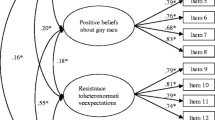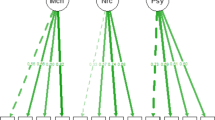Abstract
The objective of this study is to analyze the validity and reliability of the Turkish version of the Internalized Misogyny Scale (IMS). The study sample consisted of 510 students. In relation to the validity of the items comprising the scale, an item-total correlation test and internal consistency analysis were conducted. Exploratory factor analysis was used to reveal the factorial structure of the scale and to provide evidence, and confirmatory factor analysis was applied to confirm that the scale measured the theoretical structure. In order to evaluate the reliability of the scale in terms of internal consistency, Cronbach’s alpha coefficient of the scale and each subscale was calculated. In this study, the chi-square test statistic obtained from Bartlett test analysis was found to be significant (χ2 = 2444.990; p < 0.001). The scale’s item-total correlation coefficient varied from 0.32 to 0.92, and Cronbach’s alpha coefficient was 0.82. The results of the exploratory factor analysis conducted for the IMS indicate that the scale consisted of three sub-scales, namely, “Devaluing women,” “Distrust of women,” and “Gender bias in favor of men,” as in the original version, and explains 47.446% of the total variance. Consequently, the 17-item scale and three factors were found to be theoretically and statistically acceptable. The IMS was proven to be a valid and reliable tool of measurement.

Similar content being viewed by others
References
Adıbelli, D., Ünal, A. S., & Şen, T. (2019). Attitudes of young adult men toward domestic violence and factors affecting their attitudes in Turkey. Journal of Interpersonal Violence, 34(18), 3961–3977.
Akpinar, F., Yilmaz, S., Karahanoglu, E., Ozelci, R., Coskun, B., Dilbaz, B., & Tekin, Ö. M. (2019). Intimate partner violence in Turkey among women with female infertility. Sexual and Relationship Therapy, 34(1), 3–9.
Altınay, A. G., & Arat, Y. (2007). Türkiye’de Kadına Yönelik Şiddet (Violence against women in Turkey). Istanbul: Punto Baskı Çözümleri.
Baydar, V., Serpen, A. S. (2015). Feminist Sosyal Hizmet Perspektifinden Taht Oyunları (Game Of Thrones) Dizisinde Kadın Düşmanlığının İncelenmesi. Sosyal Hizmet Sempozyumu (Social Service Symposium). http://sosyalhizmetsempozyumu2015.org/index.php/shs2015/shs2015/paper/viewFile/57/48. 4 Sept 2016.
Bilgel, N., & Akıncı, S. (2011). Workplace violence: a study of Turkish workers. International Journal of Occupational Safety and Ergonomics (JOSE), 17(4), 385–402.
Büyüköztürk Ş (2011) Testlerin Geçerlik ve Güvenirlik Analizlerinde Kullanılan Bazı İstatistikler (some statistics used in the validity and reliability analysis of tests). Sosyal Bilimler İçin Veri Analizi El Kitabı (data analysis handbook for social sciences), 15. Edition (pp. 167–82). Ankara: Pegem Academy.
Büyüköztürk, Ş., Bökeoğlu, Ö. Ç., & Köklü, N. (2008). Sosyal Bilimler İçin İstatistik (statistics for social sciences) (3rd ed.). Ankara: Pegem Academy.
Çapık, C., Gözüm, S., & Aksayan, S. (2018). Intercultural scale adaptation stages, language and culture adaptation: updated guideline. FNJN Florence Nightingale Journal of Nursing, 26, 199–210.
Çimen, Ü. (2011). Kadın Düşmanlığı ve Kadın Üzerine Özlü Sözler (Women’s enmity and quotations about women) (1st ed.). Istanbul: Cinius Publications.
Code, L. (2000). Encyclopedia of feminist theories (1st ed.p. 346). London: Routledge.
Erdoğan, S., Nahcivan, N., & Esin, N. (2015). Hemşirelikte Araştırma (Research in nursing) (2nd ed.). Istanbul: Nobel Publications.
Erefe, İ. (2012). Veri toplama araçlarının niteliği. Hemşirelikte Araştırma, Ilke, Süreç Ve Yöntemleri (quality of data collection tools. Research principle processes and methods in nursing) (4th ed.). Istanbul: Odak Offset.
Etyang P (2012) Misogyny in urban public and private spaces. A Conference Paper Presented at the International Conference On Gender Based Violence At Kenyatta University, Kenya.
Flood, M., Gardiner, J. K., & Pease, B. (2009). International encyclopedia of men and masculinities. London: Taylor & Francis.
Gülçür L (1999) A study on domestic violence and sexual abuse in Ankara, Turkey. http://www.wwhr.org/images/sexual_abuse.pdf. Accessed 13 Jan 2016.
Hegney, D., Plank, A., & Parker, V. (2003). Workplace violence in nursing in Queensland, Australia: a self-reported study. International Journal of Nursing Practice., 9, 261–268.
Jackson, D., Clare, J., & Mannix, J. (2002). Who would want to be a nurse? Violence in the workplace-a factor in recruitment and retention. Journal of Nursing Management, 10, 13–20.
Kılıçarslan, M. (2018). Violence against women: causes and Qur’anic measures for prevention. Cukurova University Journal of Faculty of Divinity, 18(2), 958–994.
Kırlıoğlu M, Akpınar B, Şenel D (2015) Şarkılarda kadına yönelik şiddetin izleri: niteliksel bir çalışma. Sosyal Hizmet Sempozyumu (Social Service Symposium). http://sosyalhizmetsempozyumu2015.org/index.php/shs2015/shs2015/paper/viewFile/57/48. 13 Jan 2016.
Kramarae, C. C. (2000). Routledge International Encyclopedia of Women (Vol. 2000, pp. 1374–1377). New York: Routledge.
Laher, S. (2010). Using exploratory factor analysis in personality research: best-practice recommendations. SA Journal of Industrial Psychology/SA Tydskrif vir Bedryfsielkunde, 36, 1–7.
Oktay, Y. B. (2003). Geleneklerin Ardındaki Ölümler: Töre Cinayetleri. (Deaths after traditions: honour killing). Kadın Araştırmaları Dergisi (Journal of Women's Studies), 8, 69–86.
Özcan, N. K., Günaydın, S., & Çitil, E. T. (2016). Domestic violence against women in Turkey: a systematic review and meta analysis. Archives of Psychiatric Nursing, 30(5), 620–629.
Özdamar, K. (2002). Güvenirlik ve Soru Analizi. Paket Programlar ile İstatistiksel Veri Analizi (Reliability and question analysis. Statistical data analysis with packet programs) (Vol. 1, 4th ed.pp. 511–525). Eskişehir: Etam AŞ.
Piggot, M. (2004). Double jeopardy: lesbians and the legacy of multiple stigmatized identities. Australia: Psychology Strand at Swinburne University of Technology unpublished thesis.
Sayın, G. (2008). Caryl Churchill’in Sirke Tom (1977) Oyununda ‘Cadı’ İmgesine Feminist Yaklaşım. Dil ve Edebiyat Dergisi (Journal of Linguistics and Literature), 5(1), 17–38.
Sen, S., & Bolsoy, N. (2017). Violence against women: prevalence and risk factors in Turkish sample. BMC Women’s Health, 17(1), 100.
Şencan, H. (2005). Sosyal ve Davranışsal Ölçümlerde Güvenilirlik ve Geçerlilik (Reliability and Validity in Social and Behavioral Measurements) (1st ed.). Ankara: Seçkin Publishing.
Şenol, D., & Yıldız, S. (2013). Kadına Yönelik Aile İçi Şiddet Algısı: Kadın ve Erkek Bakış Açılarıyla. Mutlu Çocuklar Derneği Yayınları: Ankara.
Sümbüloğlu, K., & Sümbüloğlu, V. (2005). Biostatistics (11th ed.). Ankara: Hatipoğlu Publishing.
Szymanski, D. M., Gupta, A., Carr, E. R., & Stewart, D. (2009). Internalized misogyny as a moderator of the link between sexist events and women’s psychological distress. Sex Roles, 61, 101–109.
T.C. Başbakanlık Aile Araştırma Kurumu (T.R. Prime Ministry Family Research Institution). (1997). Aile İçinde ve Toplumsal Alanda Şiddet (Family and community violence). Ankara: Aile Araştırma Kurumu Yayınevi (Family Research Institute Publishing House).
T.C. Başbakanlık Kadının Statüsü Genel Müdürlüğü (T.R. Prime Ministry The General Directorate on the Status of Women). (2009). Türkiye’de Kadına Yönelik Aile İçi Şiddet (Domestic violence against women in Turkey). Ankara: Elma Technical Printing Publishing.
Türk Dil Kurumu (Turkish Language Association) (2013) Güncel Türkçe Sözlük (Current Turkish dictionary). http://www.tdk.gov.tr/index.php?option=com_gts&arama=gts&guid=TDK.GTS.5298498db77586.53247086. Accessed 10 Sept 2016.
Ural, A., & Kılıç, İ. (2006). Bilimsel Araştırma Süreci ve SPSS ile Veri Analizi (Scientific research process and data analysis with SPSS) (2nd ed.). Ankara: Detay Publishing.
Vickers, J. (2006). Bringing nations in: some methodological and conceptual issues in connecting feminisms with nationhood and nationalism. International Journal of Feminist Politics, 8(1), 84–109.
Yilmaz, O. (2018). Female autonomy, social norms and intimate partner violence against women in Turkey. The Journal of Development Studies, 54(8), 1321–1337.
Acknowledgments
The authors would not like any contribution to this research.
Author information
Authors and Affiliations
Corresponding author
Ethics declarations
Conflict of Interest
The authors declare that they have no conflicts of interest.
Ethical Approval
All procedures implemented in this study were carried out in accordance with the ethical standards of the institutional and/or national research committee and the 1964 Helsinki Declaration and its later amendments, or comparable ethical standards. Informed consent was obtained from all the participants included in the study.
Additional information
Publisher’s Note
Springer Nature remains neutral with regard to jurisdictional claims in published maps and institutional affiliations.
Rights and permissions
About this article
Cite this article
Yaman Sözbir, Ş., Vural, G. & Ünal Toprak, F. A Study for Testing the Validity and Reliability of the Turkish Version of the Internalized Misogyny Scale. Int J Ment Health Addiction 19, 1705–1715 (2021). https://doi.org/10.1007/s11469-020-00257-5
Published:
Issue Date:
DOI: https://doi.org/10.1007/s11469-020-00257-5




